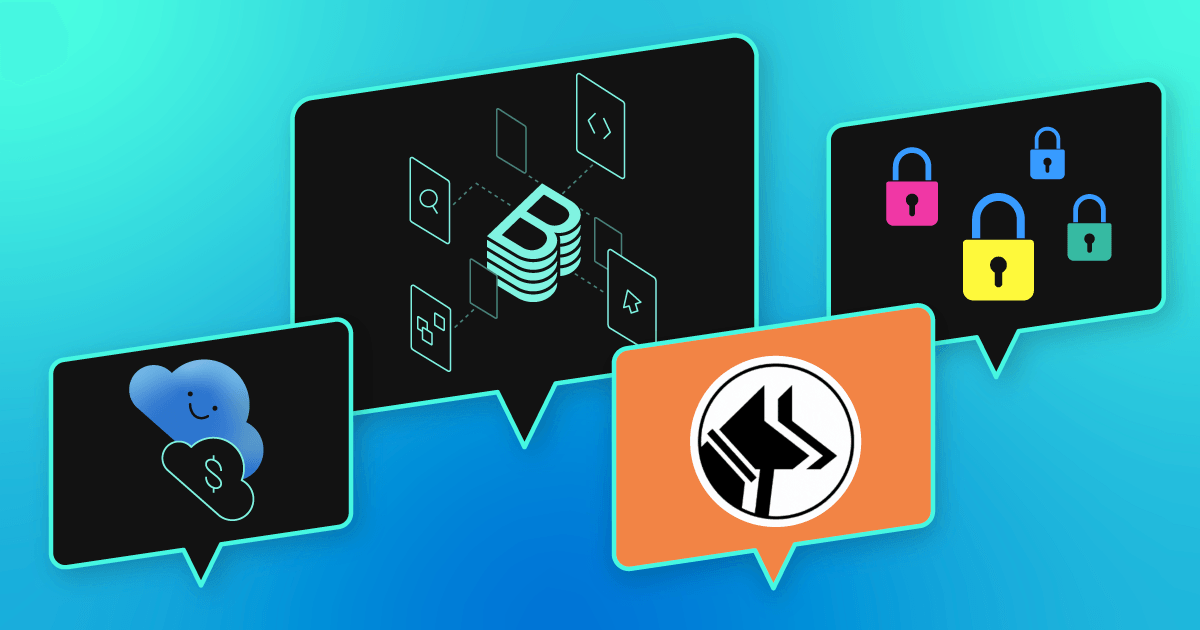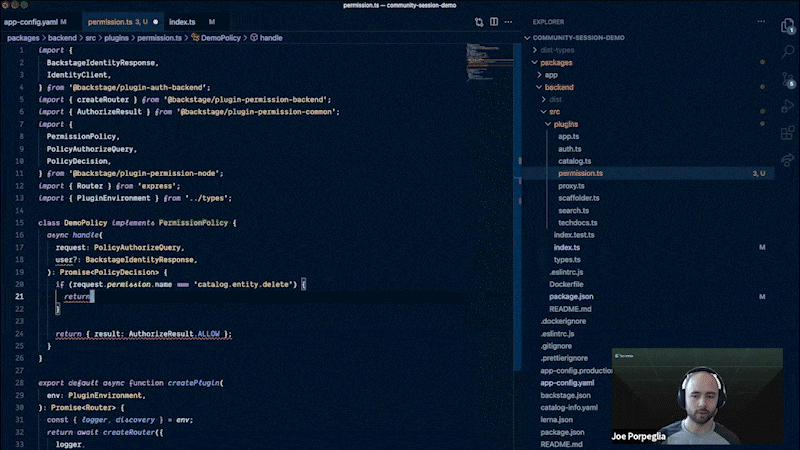Community Session: The road to 1.0, permissions framework preview, and more
- Author
- Suzanne Daniels, Spotify
- Published

Watch the Community Session videos below for a peek at the Q1 product roadmap, a whiz-bang live demo of the forthcoming permissions framework, demos of Kiratech’s open source solution for enabling digital transformation, updates on the Cost Insights and Tech Insights plugins. Plus, updates from the maintainers and Q&A. And off we go into 2022…
About the Q1 2022 product roadmap
Heading into the new year, Backstage crossed 2,000 forks and 9,000 PRs on GitHub. But as you’ll see in the Q1 product roadmap, even bigger milestones are just around the corner. Francesco Corti shared a first-look at the roadmap, which includes such big deals as:
- The impending release of Backstage 1.0 (and what that means)
- Initiating third-party security audits
- Becoming an incubating project with the CNCF
Watch the video below to see into the very near future of Backstage, and share your feedback on the roadmap.
Watch the adopters session
Along with an overview of the roadmap, other highlights from the session include:
- Kiratech demos Krateo PlatformOps: The “second wave of cloud native adoption” has arrived — and the digital transformation experts at Kiratech are easing the way for enterprise companies. Their open source tool Krateo acts as a single control pane for any resource, whether it’s a K8s cluster, microservice, application, pipeline, database, or anything else. Diego Braga shows how Krateo uses Backstage, Kubernetes, and Crossplane to make it easy for anyone to harness the power of the CNCF landscape. If a YAML file can reference it, then Krateo can manage it. Give Krateo a try yourself.
- Adding more clouds to Cost Insights: Spotify’s Tim Hansen takes us on a tour of the Cost Insights plugin — the Backstage plugin that helped Spotify save millions of dollars in cloud costs in a matter of months. (Wait, what? Yep.) The plugin is compatible with GCP out of the box, but the team is looking for contributors to add support for more cloud providers. Are you an AWS or Azure expert? PRs welcome!
- Migrating with Tech Insights: Roadie’s Jussi Hallila answers a question from the community on how the Tech Insights plugin might help drive internal software migrations, along with a quick update on the plugin as it nears its first release.
- Q&A with the maintainers: What’s the best way to get software templates for databases, Terraform, and Backstage to play nicely together?
Watch the contributors session
Highlights from the contributors session include:
-
What’s in a version number?: As the 1.0 release for Backstage approaches, the maintainers are planning to move away from date-based version numbers. But what does 1.0 really mean? Or 1.0.1? The maintainers have thought long and hard about the release process for the future versions of Backstage (both the app and the individual plugin packages), so that you know what to expect going from x.1.x to x.2.x — and everything in-between. Learn more about the proposed Release Process & Versioning Policy and share your feedback.
-
Permissions framework live demo: Joe Porpeglia from Spotify shows off how to activate and manage permissions policies in Backstage using the soon-to-be-released permissions framework.

First, marvel at the weird way Joe puts his file list on the right side of his IDE, then watch him 🔒 restrict a user’s ability to unregister entities in the software catalog, all in front of a live audience. The chat was overflowing with 👏👏👏 — both for the simplicity of the framework and for Joe’s live demoing agility.
An important feature for many adopters, the permissions framework is available for testing in the app right now, ahead of the official release. Have feedback? Let us know in the #permissions channel in the Backstage community Discord.
-
Employing task workers for the Backstage scaffolder: Roadie introduces their more secure, scalable infrastructure for running scaffolder tasks, separate from backend privileges. Task workers are handy, and in some cases essential, when you’re a Backstage service provider, like Roadie, working with customers who need to restrict how the network, load balancers, and other internal resources are shared. Using Roadie’s task workers implementation, scaffolder tasks are run, scheduled, and stored in a constrained environment, making deployment tasks safer and easier.
-
Q&A with the maintainers: When is Backstage 1.0 coming and more on the Q1 2022 product roadmap.